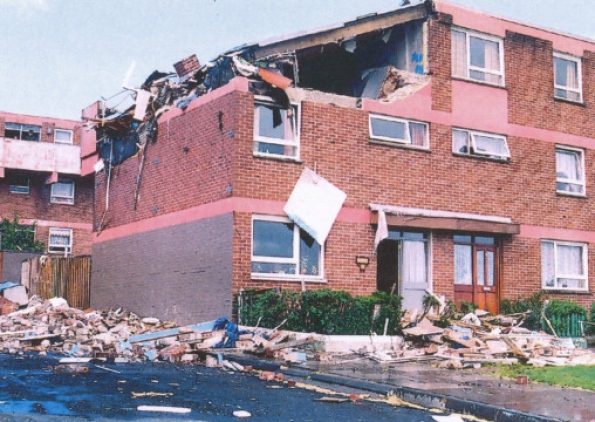
The bombed flat at Kildrum Gardens, Creggan, where three people were killed in August 1988.
Lawyers for relatives of one of the victims of the so-called Good Samaritan attack in Derry claimed there is a legal obligation to hold a fresh tribunal.
Eugene Dalton, 54, and Sheila Lewis, 68, were both killed in the explosion at a house in Kildrum Gardens, Creggan in August 1988.
A third victim, 57-year-old Gerard Curran, died months after being pulled from the rubble.
The attack became known as the ‘Good Samaritan Bombing’ because the three friends had gone to check on the whereabouts of a neighbour kidnapped earlier by the IRA.
The IRA apologised, admitting it had planted the device in a bid to kill soldiers.
Mr Dalton’s daughter, Rosaleen, is challenging the Attorney General’s decision not to order a new inquest following a report by Police Ombudsman Dr Michael Maguire.
In 2013 the watchdog published findings that RUC officers had information about an IRA booby trap bomb in a house in the housing estate but did nothing to warn residents of the possible danger.
Dr Maguire identified a failure in the police obligation to protect the lives of the public.
It was believed that the RUC were protecting a high level informant inside the IRA.
Following his report Attorney General John Larkin QC decided a new inquest was not advisable at that time.
But the Dalton family and their legal team claim it could help to establish responsibility for police failures.
They contend that investigative obligations under Article 2 of the European Convention on Human Rights were rekindled by the Ombudsman’s findings.
In March 2017 a High Court judge refused to quash Mr Larkin’s decision, citing the financial and human costs of a further public hearing which would be unlikely to advance the goal of prosecuting the perpetrators.
Challenging that ruling on behalf of the Dalton family, Fiona Doherty QC told the Court of Appeal:
“The applicant says there is a plausible, credible allegation that the deaths caused by a major crime of grave public concern could have been prevented by police action.
“The question for the court is what does the law, in particular the Human Rights Act, require by way of a response to the information that has been newly revealed by the Police Ombudsman report.
“That information cries out for an explanation. This is a case about responsibility and accountability, and the need to ensure that the Article 2 obligation is satisfied.
“In this case it requires the holding of the inquest.”
Judgement has been reserved in the case.
Tags:




